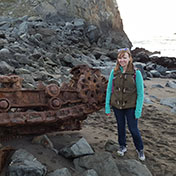Alcohol harm reduction is saving lives during COVID-19
- Amanda Farrell-Low

When Canada and many other countries starting locking down in March, people were advised to stay home and physically distance. But what does that look like when you don’t have a home and are dependent on alcohol? What if you lose your sources of income like panhandling or collecting bottles to earn money, the drop-in centre you frequent closes, or the local liquor store no longer accepts cash?
“COVID-19 has exposed a lot of gaps in our society, especially for people experiencing homelessness and/or housing instability, including those with severe alcohol dependence,” says Bernie Pauly, a scientist with the Canadian Institute for Substance Use Research and Nursing professor at the University of Victoria. “While these barriers existed pre-COVID-19, loss of services during COVID 19 has resulted in an increase in alcohol-related harms.”
CMAPS: new programs open during COVID
Pauly is one of the lead researchers of the Canadian Managed Alcohol Program Study (CMAPS), which has been examining the implementation and impacts of these programs in reducing alcohol-related harms and improving quality of life for participants. Managed Alcohol Programs, or MAPs, are made-in-Canada alcohol harm-reduction programs where people experiencing homelessness and serious harms related to alcohol use—drinking non-beverage alcohol like mouthwash and sanitizer, for instance, or having frequent emergency room visits or dealings with police—are provided with regular doses of alcohol throughout the day, along with housing and other supports. While MAPs largely flew under the radar for years, the COVID-19 crisis has led to a surge in interest, with new programs opening up across the country.
Pauly says the research team heard from peers, health care and housing providers about their concerns regarding reduced alcohol availability, severe alcohol withdrawal due to lack of ability to earn money, and the challenges of following stay-at-home orders without a home. People with severe alcohol dependence may have pre-existing health issues—and alcohol consumption can also increase vulnerability to COVID-19. There were additional concerns that people with severe alcohol dependence who contract COVID-19 would require a safe, secure alcohol supply, as opposed to the non-beverage alcohol options they sometimes turn to, to prevent harms during isolation.
“MAPs formed during COVID-19 look different than the ‘traditional’ model in that they can be outreach-based, where clients are seen in the community and provided with supports and alcohol where they live,” explains Pauly. “This aligns with principles of Housing First but is a new take on the residential model, which was more common before COVID-19.”
But do MAPs work? Findings from CMAPS say yes. The study shows that MAPs play a significant role in stopping the constant cycle of displacement, survival, and disconnection for people experiencing housing instability and severe alcohol dependence. Before they were enrolled in MAPs, participants often reported cycling through abstinence-based health, housing, justice and social systems where only their basic health and housing needs were met. MAPs introduce alcohol harm reduction as an alternative to abstinence-based support, while creating opportunities to also connect with family, community and cultural supports.
Some of the other outcomes associated with MAPs include consuming less non-beverage alcohol like mouthwash or hand sanitizer; drinking less daily (although consumption on more days per month); significantly fewer self-reported health and social harms such as seizures, passing out, falls, assaults and financial insecurity; and economic savings associated with reduced hospital admissions and time in police custody.
Researchers, caregivers and service providers have also been exploring how to better support and collaborate with Indigenous clients. “We are continuing to build understanding of decolonized approaches that centre Indigenous knowledge in their design and implementation as important to safety and healing,” Pauly says.
Pauly, co-lead Tim Stockwell and the rest of the research team have seen their work getting even more attention since COVID-19 hit. For example, BC recently released Operational Guidance for MAPs in the province, which was developed by CMAPS researchers and the BC Centre on Substance Use.
Evidence-based decisions
“This research project originated from service providers and policy makers in BC who wanted to ensure the development and implementation of MAPs would be informed by evidence,” says Pauly. “We assisted with initial program evaluations which quickly expanded to include programs across Canada. Before CMAPS started in 2011, there was really only one peer-reviewed and published evaluation of MAP and a small number of program-evaluation reports. Since then the evidence base has grown exponentially.”
A key component of CMAPS that has helped the project communicate findings and have an impact on policy and practice is the CMAPS community of practice. The group has grown to more than 300 members across Canada and internationally, and these members include MAP workers and operators, researchers and others. They regularly host roundtable discussions, share their experiences and expertise and work with the CMAPS research team figure out what information would be most practical to share.
“At the start of COVID-19, they quickly identified the need for accessible and rapidly available information, which resulted in us producing materials on key MAP topics that were immediately put to use,” Pauly says, referring to bulletins on the scaling up of MAPs and safer drinking during COVID-19 (which has been used by several Canadian jurisdictions and translated into three other languages).
Canadian approach goes global
Outside Canada, Pauly and Stockwell have presented to policy makers and services providers and acted as consultants to the Scottish government and Australian service providers. Pauly is a member of a team in Scotland who is exploring the feasibility of MAPs in the Scottish context and they have produced a number of guidelines, and both her and Stockwell are members of an Australian research team developing, implementing and evaluating MAP in that country.
Indeed, this innovative Canadian-made harm-reduction approach looks to be spreading beyond our borders, thanks in part to the evidence base created by the Canadian Managed Alcohol Program Study.
Photos
In this story
Keywords: CISUR, addiction, alcohol, research, nursing, health, homelessness, COVID, Research Accelerator Fund
People: Bernie Pauly





